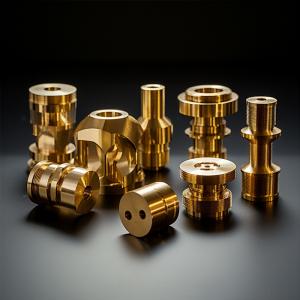
Add to Cart
Brass CNC Turned Components Manufacturers CNC Machining Automotive Parts
CNC Precision Turning Parts
Custom CNC machining stands as the predominant subtractive manufacturing technology,
offering an optimal solution for crafting personalized metal and plastic parts tailored to
prototyping and production needs.
Leveraging CAD (computer-aided design) modeling software and G-code, CNC milling and
CNC turning machines meticulously remove material from a solid workpiece with unparalleled
precision and efficiency.
CNC machines excel in producing robust parts characterized by tight tolerances and a spectrum
of impressive material properties, both mechanical and chemical.
Our custom CNC machining service is particularly well-suited for one-off projects and
low-to-medium volume production, benefitting from the advantages of automation and
high repeatability.
Product Details
Brass is renowned for its exceptional machinability, making it an excellent choice for
CNC machining. Its versatility and desirable properties extend its application across various
industries, including plumbing, electrical, and medical.
Brass offers impressive durability and is favored for its ease of workability.
Its adaptability and simplicity in machining make it a prevalent choice for producing parts
across a wide range of applications.
| Common Brass Materials | |
| No. | Properties |
| Brass C3600 | It has superior machinability, thread rolling and knurling characteristics. Typically used in the manufacture of fluid connectors, threaded inserts, couplings, and more. |
| Brass C3602 | It’s strength and resistance to corrosion with properties closely resembling that of steel. It is ideal for some of the most demanding conditions such as heavy industrial parts. |
| Brass C3604 | It is used in the mass production of brass components. It is widely used in manufacturing hardware, connector, flange and other machine parts by lathe and CNC. |
| Brass C4926 | A low leaded free cutting brass which conform RoHs and Reach environment regulations. Widely used on electronic parts, precision machine, valves, and related parts. |



Brass Finishing and Post-Processing
360 Brass has a shiny yellow finish that varies depending on surface roughness.
It can be hand-polished to increase its sheen, or media blasted for more of a matte texture.
| Name | Machining Marks |
| As machined | Visible, light surface scratches |
| Smooth machining | Visible, light surface scratches |
| Fine machining | Slightly visible |
| Polishing | Removed on primary surfaces |
| Bead blasting | Removed for non-cosmetic, removed on primary surfaces for cosmetic |
| Brushing | Reduced for non-cosmetic, removed on primary surfaces for cosmetic |
| Powder coating | Removed |
| Black oxide | Visible |
Applications of CNC Brass Parts
CNC machining is a prevalent subtractive manufacturing process, and its utilization is extensive
across various industries. Some of the industries that heavily rely on CNC machining include:
1. Aerospace:
The aerospace industry extensively utilizes CNC machining for the production of precise and
complex components used in aircraft and spacecraft.
2. Automotive:
In the automotive sector, CNC machining plays a crucial role in manufacturing high-precision
components for vehicles, ensuring efficiency and reliability.
3. Aviation:
The aviation industry relies on CNC machining for the production of components that require
exceptional precision and adherence to strict quality standards.
4. Transportation:
The transportation industry, encompassing various modes such as trains and ships, utilizes
CNC machining for the fabrication of critical components for smooth and reliable operation.

Company Profile


FAQ's
1. Machined Parts Tolerances Overview:
Our tolerances for machined parts are as follows:
Local tolerances of +.005”/- .005” are applicable across most geometries in metals, with a
variation of +/- 0.010" for plastics. Tolerances may differ for large parts, particularly concerning
flatness over large parts after heat treatment.
For "As Milled" finish, a minimum surface finish of 125 is required for CNC parts.
All fabricated parts adhere to a dimensional tolerance of 0.010” and an angular tolerance of 1°.
Tapped holes not explicitly called out as features on the quoted CAD model may be machined to
the diameters specified in that model.
Surface treatments (e.g., anodize, bead blast, iridite, powder coat, etc.) will not be applied
unless explicitly paid for and acknowledged.
2. Can I use my own material for production?
Yes, customer-supplied material is fine so long as it fits with our machine capabilities.
3. How can I be assured that my design will be treated confidentially?
We take confidentiality seriously and are willing to sign and uphold any non-disclosure or
confidentiality agreement. Additionally, our factory strictly prohibits the taking of photographs of
a customer's product without explicit permission.
Ultimately, our commitment to preserving your design's confidentiality is reinforced by our
longstanding reputation, having worked with hundreds of thousands of unique designs over
many years, without ever divulging proprietary information to third parties.
4. How does compare to other suppliers in terms of price?
While direct comparisons can be challenging, We generally offers prices that are typically 25-45%
lower for plastic injection mold tools and CNC machined/turned parts when compared to suppliers
in North America and Europe.
In contrast to Chinese suppliers, our strategy is not to compete solely on price. Instead,
we prioritize delivering the highest levels of quality, swift response times, and professional results.